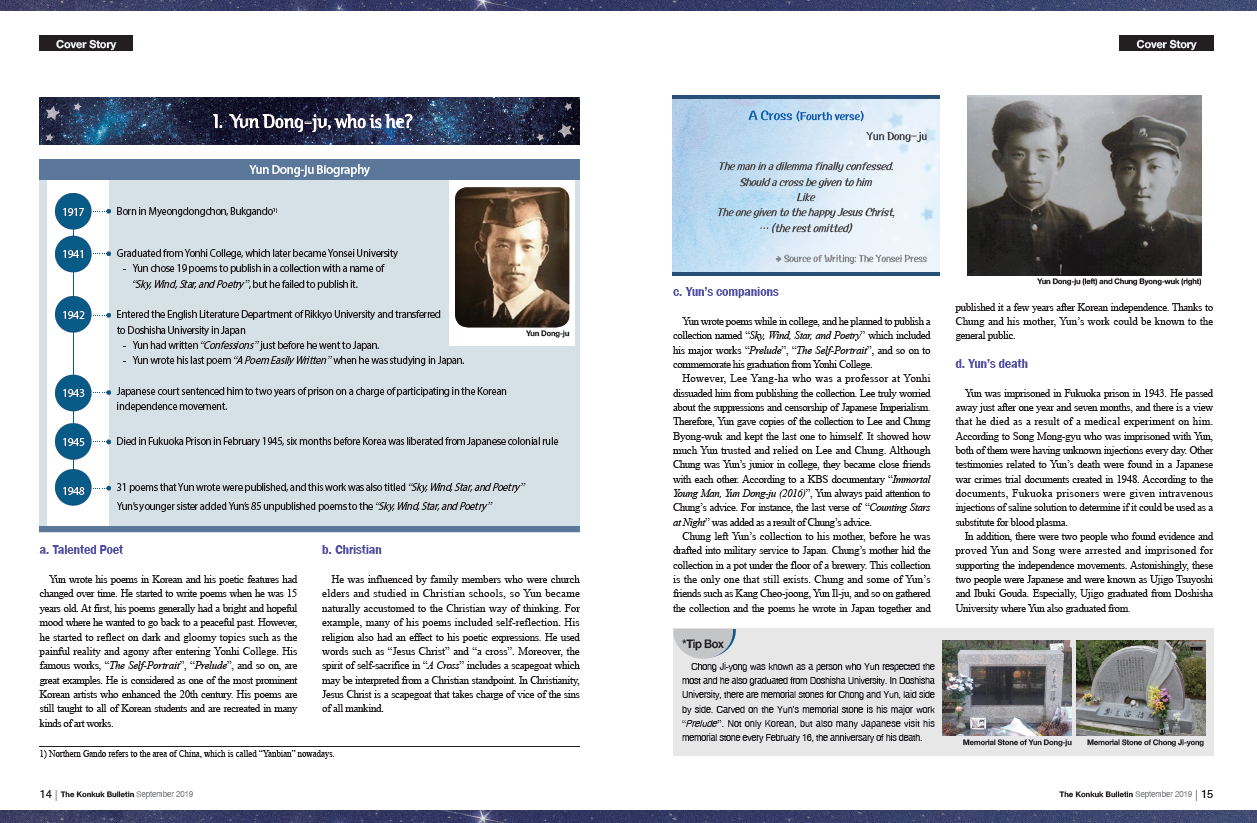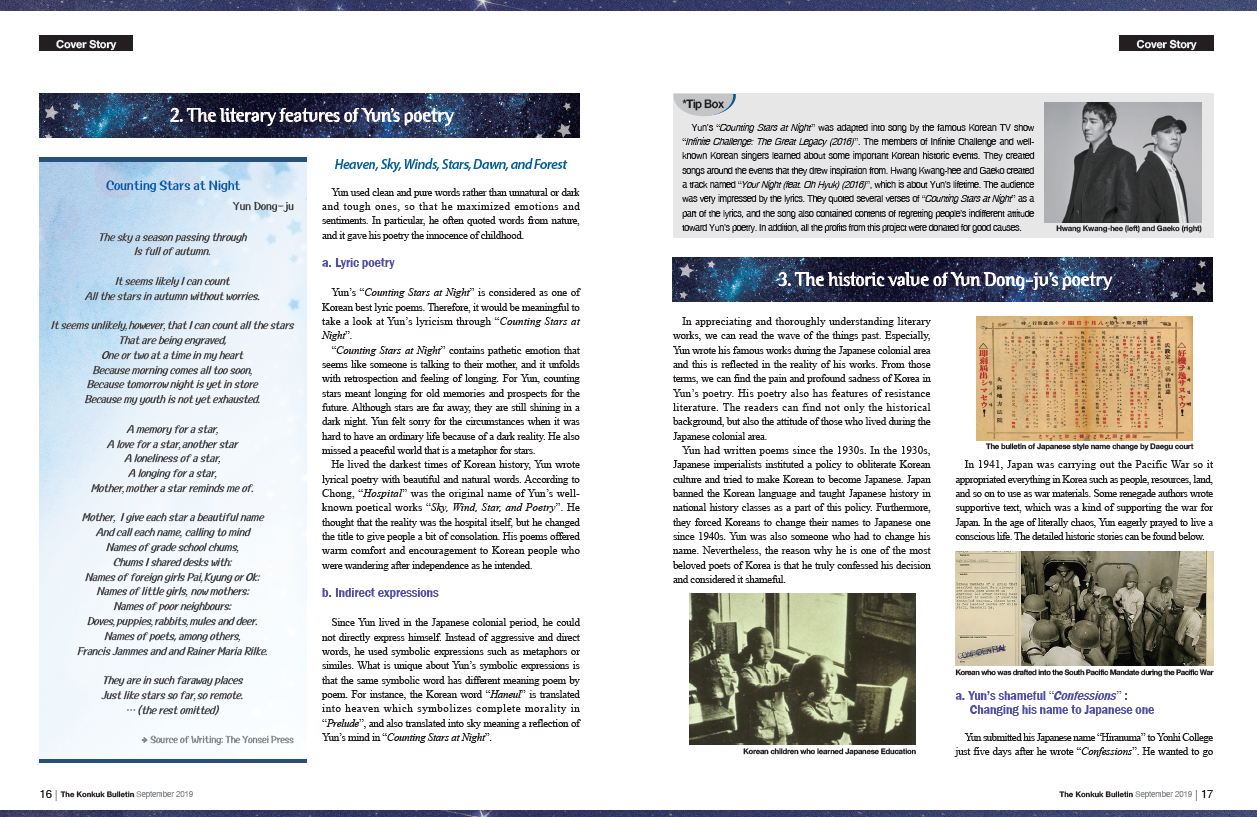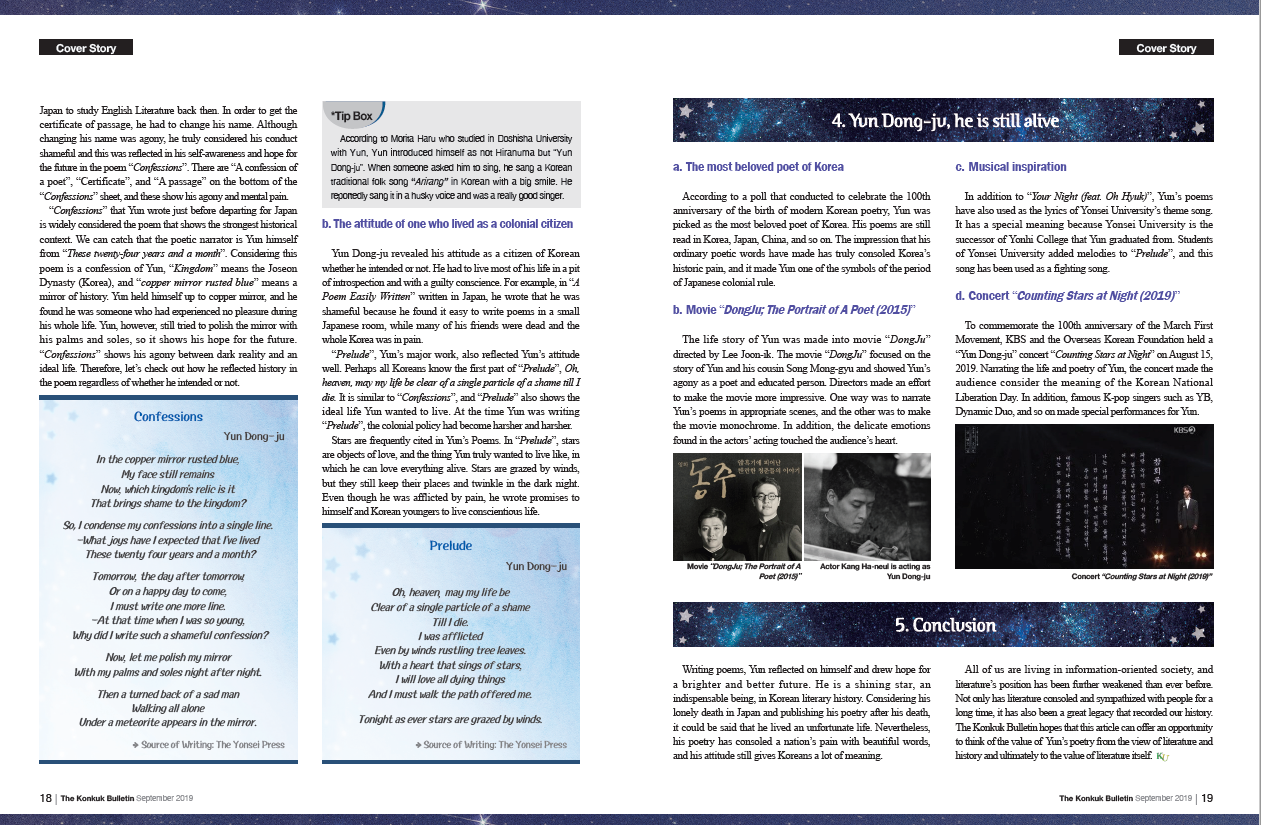The literary and historic meanings that Yun Dong-ju’s poetry retained

|
1. Yun Dong-ju, who is he?
a. Talented Poet
Yun wrote his poems in Korean and his poetic features had changed over time. He started to write poems when he was 15 years old. At first, his poems generally had a bright and hopeful mood where he wanted to go back to a peaceful past. However,he started to reflect on dark and gloomy topics such as the painful reality and agony after entering Yonhi College. His famous works, “The Self-Portrait”, “Prelude”, and so on, are great examples. He is considered as one of the most prominent Korean artists who enhanced the 20th century. His poems are still taught to all of Korean students and are recreated in many kinds of art works.
b. Christian
He was influenced by family members who were church elders and studied in Christian schools, so Yun became naturally accustomed to the Christian way of thinking. For example, many of his poems included self-reflection. His religion also had an effect to his poetic expressions. He used words such as “Jesus Christ” and “a cross”. Moreover, the
spirit of self-sacrifice in “A Cross” includes a scapegoat which may be interpreted from a Christian standpoint. In Christianity, Jesus Christ is a scapegoat that takes charge of vice of the sins of all mankind.
c. Yun’s companions
Yun wrote poems while in college, and he planned to publish a collection named “Sky, Wind, Star, and Poetry” which included his major works “Prelude”, “The Self-Portrait”, and so on to commemorate his graduation from Yonhi College. However, Lee Yang-ha who was a professor at Yonhi dissuaded him from publishing the collection. Lee truly worried about the suppressions and censorship of Japanese Imperialism. Therefore, Yun gave copies of the collection to Lee and Chung Byong-wuk and kept the last one to himself. It showed how much Yun trusted and relied on Lee and Chung. Although Chung was Yun’s junior in college, they became close friends with each other. According to a KBS documentary “Immortal Young Man, Yun Dong-ju (2016)”, Yun always paid attention to Chung’s advice. For instance, the last verse of “Counting Stars at Night” was added as a result of Chung’s advice. Chung left Yun’s collection to his mother, before he was drafted into military service to Japan. Chung’s mother hid the collection in a pot under the floor of a brewery. This collection is the only one that still exists. Chung and some of Yun’s friends such as Kang Cheo-joong, Yun Il-ju, and so on gathered the collection and the poems he wrote in Japan together and published it a few years after Korean independence. Thanks to Chung and his mother, Yun’s work could be known to the general public.
d. Yun’s death
Yun was imprisoned in Fukuoka prison in 1943. He passed away just after one year and seven months, and there is a view that he died as a result of a medical experiment on him. According to Song Mong-gyu who was imprisoned with Yun, both of them were having unknown injections every day. Other testimonies related to Yun’s death were found in a Japanese war crimes trial documents created in 1948. According to the documents, Fukuoka prisoners were given intravenous injections of saline solution to determine if it could be used as a substitute for blood plasma. In addition, there were two people who found evidence and proved Yun and Song were arrested and imprisoned for supporting the independence movements. Astonishingly, these two people were Japanese and were known as Ujigo Tsuyoshi and Ibuki Gouda. Especially, Ujigo graduated from Doshisha University where Yun also graduated from.
2. The literary features of Yun’s poetry
Heaven, Sky, Winds, Stars, Dawn, and Forest
Yun used clean and pure words rather than unnatural or dark and tough ones, so that he maximized emotions and sentiments. In particular, he often quoted words from nature,
and it gave his poetry the innocence of childhood.
a. Lyric poetry
Yun’s “Counting Stars at Night” is considered as one of Korean best lyric poems. Therefore, it would be meaningful to take a look at Yun’s lyricism through “Counting Stars at Night”.
“Counting Stars at Night” contains pathetic emotion that seems like someone is talking to their mother, and it unfolds with retrospection and feeling of longing. For Yun, counting
stars meant longing for old memories and prospects for the future. Although stars are far away, they are still shining in a dark night. Yun felt sorry for the circumstances when it was
hard to have an ordinary life because of a dark reality. He also missed a peaceful world that is a metaphor for stars. He lived the darkest times of Korean history, Yun wrote lyrical poetry with beautiful and natural words. According to Chong, “Hospital” was the original name of Yun’s wellknown poetical works “Sky, Wind, Star, and Poetry”. He thought that the reality was the hospital itself, but he changed the title to give people a bit of consolation. His poems offered warm comfort and encouragement to Korean people who were wandering after independence as he intended.
b. Indirect expressions
Since Yun lived in the Japanese colonial period, he could not directly express himself. Instead of aggressive and direct words, he used symbolic expressions such as metaphors or
similes. What is unique about Yun’s symbolic expressions is that the same symbolic word has different meaning poem by poem. For instance, the Korean word “Haneul” is translated
into heaven which symbolizes complete morality in “Prelude”, and also translated into sky meaning a reflection of Yun’s mind in “Counting Stars at Night”.
3. The historic value of Yun Dong-ju’s poetry
In appreciating and thoroughly understanding literary works, we can read the wave of the things past. Especially, Yun wrote his famous works during the Japanese colonial area
and this is reflected in the reality of his works. From those terms, we can find the pain and profound sadness of Korea in Yun’s poetry. His poetry also has features of resistance
literature. The readers can find not only the historical background, but also the attitude of those who lived during the Japanese colonial area. Yun had written poems since the 1930s. In the 1930s, Japanese imperialists instituted a policy to obliterate Korean culture and tried to make Korean to become Japanese. Japan banned the Korean language and taught Japanese history in national history classes as a part of this policy. Furthermore, they forced Koreans to change their names to Japanese one since 1940s. Yun was also someone who had to change his name. Nevertheless, the reason why he is one of the most beloved poets of Korea is that he truly confessed his decision and considered it shameful. In 1941, Japan was carrying out the Pacific War so it appropriated everything in Korea such as people, resources, land, and so on to use as war materials. Some renegade authors wrote
supportive text, which was a kind of supporting the war for Japan. In the age of literally chaos, Yun eagerly prayed to live a conscious life. The detailed historic stories can be found below.
a. Yun’s shameful “Confessions ” :
Changing his name to Japanese one Yun submitted his Japanese name “Hiranuma” to Yonhi College just five days after he wrote “Confessions”. He wanted to go Japan to study English Literature back then. In order to get the certificate of passage, he had to change his name. Although changing his name was agony, he truly considered his conduct shameful and this was reflected in his self-awareness and hope for the future in the poem “Confessions”. There are “A confession of a poet”, “Certificate”, and “A passage” on the bottom of the “Confessions” sheet, and these show his agony and mental pain. Confessions” that Yun wrote just before departing for Japan is widely considered the poem that shows the strongest historical context. We can catch that the poetic narrator is Yun himself from “These twenty-four years and a month”. Considering this poem is a confession of Yun, “Kingdom” means the Joseon Dynasty (Korea), and “copper mirror rusted blue” means a mirror of history. Yun held himself up to copper mirror, and found he was someone who had experienced no pleasure during his whole life. Yun, however, still tried to polish the mirror with his palms and soles, so it shows his hope for the future. “Confessions” shows his agony between dark reality and an ideal life. Therefore, let’s check out how he reflected history in the poem regardless of whether he intended or not.
b. The attitude of one who lived as a colonial citizen Yun Dong-ju revealed his attitude as a citizen of Korean whether he intended or not. He had to live most of his life in a pit of introspection and with a guilty conscience. For example, in “A Poem Easily Written” written in Japan, he wrote that he was shameful because he found it easy to write poems in a small Japanese room, while many of his friends were dead and the whole Korea was in pain. “Prelude”, Yun’s major work, also reflected Yun’s attitudewell. Perhaps all Koreans know the first part of “Prelude”, Oh, heaven, may my life be clear of a single particle of a shame till I die. It is similar to “Confessions”, and “Prelude” also shows the ideal life Yun wanted to live. At the time Yun was writing “Prelude”, the colonial policy had become harsher and harsher. Stars are frequently cited in Yun’s Poems. In “Prelude”, stars are objects of love, and the thing Yun truly wanted to live like, in which he can love everything alive. Stars are grazed by winds, but they still keep their places and twinkle in the dark night. Even though he was afflicted by pain, he wrote promises to himself and Korean youngers to live conscientious life.



